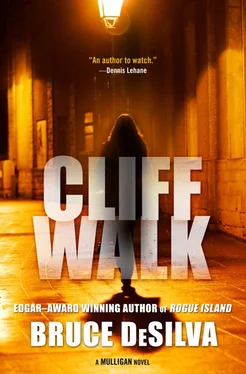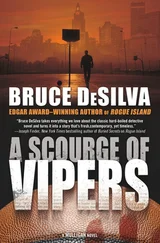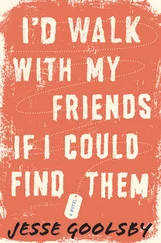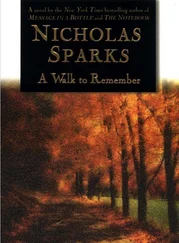“What would that be?”
“I don’t want to talk about it. Go look for yourself.”
“Touch anything?”
“Not so you’d notice. But I walked all the way through the place. Oh, and I threw up in the kitchen sink.”
“You did, huh?” Wargat said, his face cracking into a grin.
“There’s something else,” I said. “The second bedroom is padlocked. I think someone might be locked inside, but I’m not sure.”
“Stay here,” Freitas said, “while we have a look.”
I got back in the Bronco and watched the four uniforms mill around outside. Ten minutes later Wargat bolted out the apartment door, stumbled down the front steps, and gave the snuff film a thumbs-down review by emptying his stomach on the sidewalk. When he finished heaving, he walked over to the Crown Vic, opened the door, pulled out a Poland Spring bottle, and washed out his mouth. Then he shook himself like a dog, straightened his shoulders, and trudged back inside.
Another five minutes passed before Wargat and Freitas came back down the stairs, she holding the hands of two hollow-eyed little boys and he with a little girl in his arms. The detectives loaded them into the back of an ambulance that had just rolled up. Freitas pulled a notebook out of her back pocket and climbed in with them.
Wargat watched the ambulance roll down Pumgansett Street toward Douglas Avenue. Then he turned and headed straight for me.
“Step out of the car, please.”
So I did.
“Place your hands against the side of the car and spread your legs.”
By noon, the lot in front of 442 Pumgansett was filling. Camera crews spilled out of three TV vans and set up on the sidewalk across the street. Gloria sat Buddha-style on top of her little blue Ford Focus and studied the scene through a long lens. Tedesco climbed out of his meat wagon and lugged his big steel case inside. Parisi and two of his detectives arrived in an unmarked car, spoke briefly with the uniformed Providence cops guarding the door, and then followed Tedesco in. From the back of a locked patrol car, I had a good seat for the show.
Twenty minutes later, Parisi and Wargat emerged together and headed my way. Parisi looked into the backseat of the patrol car and then turned back to Wargat.
“Why is Mulligan hooked up?”
“I don’t want him going anywhere,” Wargat said, “till we get this sorted out.”
“Uncuff him.”
“Sorry, Captain. He’s in Providence police custody.”
“He’s in my custody now,” Parisi said. “This is my crime scene and my investigation, Wargat. Get used to it.”
* * *
The interrogation room at state police headquarters in Scituate smelled like fear, sweat, and nicotine. Parisi sat across from me at a heavy oak table scarred with cigarette burns and coffee cup rings. We were drinking coffee and going over my story for the third time.
“Could you recognize the tipster’s voice if you heard it again?”
“I don’t think so.”
“Any idea why he called you ?”
“The answer’s still no.”
“Think he’s involved in this?”
“My gut says he is. A citizen would have called the police.”
We reached for our paper coffee cups, then put them down when we found they were both empty. Parisi pulled my cell phone out of his shirt pocket, placed it on the table, and said, “Put it on speaker and try calling him.”
The tipster’s number was listed first under received calls. I hit send. After eight rings, a recorded voice: “I’m sorry, but the person you have called has a voice mail mailbox that has not been set up yet. Good-bye.”
Parisi slammed his palm on the table. The empty coffee cups jumped. A zebra plant on the windowsill seemed to wither. I withered a little myself.
“If he was smart,” I said, “he used an untraceable prepaid and then threw it in a Dumpster.”
“Most criminals aren’t smart.”
“Some are.”
“Yeah,” he said. “They’re the ones who keep me in business.”
“So,” I said, “are we done?”
“Not yet.”
He took off his glasses, rubbed his eyes, and put them back on again.
“In fifteen years as a detective, I never had a homicide case with a pornographer as the intended victim. Now I’ve got two of them.”
“Think this case and the hit on Maniella’s double are related?” I asked.
“There’s no evidence tying them together, but I don’t believe in coincidences.”
“Why do cops always say that? Coincidences happen every day.”
We sat quietly and thought about that for a minute.
“So,” I said, “are we done now ?”
“Not just yet. Sit tight.”
He snatched the phone from my hand to stop me from calling the Dispatch with what I knew, sprang to his feet, and went through the door.
Time crawled. My ulcer growled. Someone had left a newspaper on the floor. I picked it up, opened it to the sports section to pass the time, and found a feature on the Boston Bruins’ new forward, a Slovak named Miro Satan. The third paragraph read:
Satan looks fit and is skating fluidly.
After today, I couldn’t argue with that.
It was nearly an hour before Parisi returned and placed my phone, car keys, and camera on the table. He took the Nikon out of its case, switched it on, examined all the photos on the LED screen, said, “Humph,” and put it back in the case.
“Mulligan,” he said, “I’m going to ask you not to write about what you saw inside that apartment.”
“But you know I have to.”
He sighed. “Would it kill you to omit a few details-some things only the perps could know?”
“Perps? You think there was more than one?”
“Slip of the tongue,” he said. “Don’t read anything into it.”
“Okay.”
“So can you leave some things out for me?”
“Such as?”
“The snuff film.”
“Sorry, but I have to mention that.”
“Ah, shit. Well, how about this? Can you leave out the smashed laptops? And the note that was left for you? And the fact that there were no shell casings at the scene?”
“Meaning the killer used a revolver or picked up his brass,” I said.
“Yeah.”
I’d been too much in shock to notice that. “Sure,” I said, “I can leave those things out.”
“Screw me on this, and you and I are done.”
“Understood,” I said. “Can you release the names of the shooting victims?”
A five-second pause. “Local lowlifes. Can’t release the names till we notify their lowlife next of kin. And no way we’re gonna release the names of the kids we pulled out of there alive.”
“We wouldn’t print them if you did,” I said. “What about the little girl in the snuff film?”
“Not a clue.”
“Think maybe she got fed to Scalici’s pigs?”
“I won’t speculate.”
“So, can I go now ?”
“Not yet. Wargat and Freitas want a crack at you. When they finish playing detective, I’ll have a trooper drive you back to your car.”
* * *
By the time I got back to the newsroom that evening, it was too late to update the sketchy murder story Mason had written for the next day’s paper.
“The cops are keeping a lid on this one,” Lomax said. “All they’re saying is they’ve got three bodies, and foul play is suspected.”
“I’ve got a few details I can add,” I said.
“Give it to Mason so he can update our Web site.”
“You don’t want me to write it?”
“No way,” Lomax said. “You found the bodies, so you’re part of the story now. Mason’s gonna interview you-treat you as a source.”
“Okay,” I said. “Soon as I get something in my stomach.”
Читать дальше












